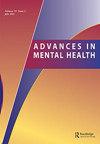Moderating effect of personality traits on the relationship between risk-taking behaviour and self-injury among first-year university students
IF 1.7
Q3 PSYCHIATRY
引用次数: 2
Abstract
ABSTRACT Objective This study aimed to examine the moderating effect of personality traits on the relationship between risk-taking behaviour and self-injury among first-year university students. Method A correlational survey design was utilised. A multistage sampling procedure was utilised to select the study sample. Three hundred and twelve university first-year students of a South African university consisting of 126 males and 186 females aged between 17 and 19 years participated in the study. Data collected were analysed with SPSS v.24 at 0.05 significant level. Results Agreeableness, conscientiousness, and neuroticism significantly correlated with self-injury. Openness to experience significantly moderated the relationship between risk-taking behaviour and self-injury (B = −0.013, SE = .005, p = .012). The relationship was positive and statistically significant at low, average, and high levels of openness to experience. The relationship, was, however, the strongest at low openness to experience point. Discussion It was concluded that the predictive impact of risk-taking behaviour on self-injury of university first-year students is enhanced by openness to experience personality trait. It was recommended that risk assessments and measures aiming to prevent/reduce self-harm among students be embraced by high institutions.人格特质对大一学生冒险行为与自伤关系的调节作用
摘要目的探讨人格特质在大一学生冒险行为与自伤行为之间的调节作用。方法采用相关调查设计。采用多阶段抽样程序选择研究样本。南非一所大学的312名一年级学生参加了这项研究,其中包括126名男性和186名女性,年龄在17至19岁之间。收集的数据用SPSS v.24进行统计学分析,统计学水平为0.05。结果亲和性、严谨性和神经质与自伤有显著相关。经验开放性显著调节了冒险行为与自伤之间的关系(B = - 0.013, SE =。005, p = .012)。在低水平、平均水平和高水平的经验开放程度上,这种关系是正的,具有统计学意义。然而,这种关系在经验点开放度较低时最为强烈。结论:冒险行为对大一学生自伤行为的预测作用在开放性人格特质的作用下得到增强。建议高等院校采用旨在预防/减少学生自残的风险评估和措施。
本文章由计算机程序翻译,如有差异,请以英文原文为准。
求助全文
约1分钟内获得全文
求助全文

 求助内容:
求助内容: 应助结果提醒方式:
应助结果提醒方式:


